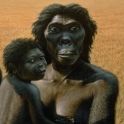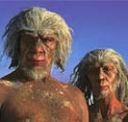|
.
Evolutionary Psychology mind and behaviour |
|
|
|
Some of the charges against evolutionary psychology are: 1. That it proposes a genetic deterministic model for human behaviour (Krebs, 2003, p. 842). In other words human behaviour and personality is purely genetically determined and simply the "natural" outcome of natural selection; furthermore humans have no real control over their final behaviour. This argument is often framed within the contexts of the Social Darwinist and eugenics debates of the late 19th and early 20th centuries. Here human beings were reduced to the dialogue of 'breeding-stock' and discussion centred around the appropriate methodologies that would ensure only the 'most genetically fit and pure' were able to survive and reproduce. This in turn created a strong socio-cultural context for the Nazi killing-machine to become established in Germany - with very disastrous results both for Germany, Europe and much of the world. And... 2. It does not account for external environmental influences (Krebs, 2003, p. 842). However, evolutionary psychologist suggest these claims are based upon misrepresentations about evolutionary psychological theory. Both these claims are postulated upon an outdated assumptions about the relationship between the genotype and phenotype of an organism. This assumption basically proposes static model, ie the organism's genotype will directly influence its the outcome of its phenotype . Although twin studies have established that some behavioral patterns seem to be genetically pre-determined ie the genotype influences the phenotype, the evidence so far points to a combination of both genetic and environmental factors having an impact on the 'final' behavioral pattern ie. the phenotype (Franzoi, 2001, p. 442; Weiten, 2001, pp.114-115). However even the genotype/environmental “revelation” is not wholly accurate. In the case of humans beings, who are apparently one of the few species on earth that is self-aware - they are also able to consciously self-assess their behavioral phenotype and then deliberately alter their own behavior ie alter their phenotype (to some degree). As Leda Cosmides succinctly puts it this way “Evolutionary psychologists think that behaviour is a joint product of the information in our environments and the programs in our heads “.
Evolutionary
theory states that human beings are a “product” of the
evolutionary processes of adaptation via natural selection.
During latter part of the 20th century, science has realised that the
human mind and body are part of the same functional system. However psychology has tended to follow a much earlier paradigm - one that treats the mind and body a seperate systems. While many of evolutionary psychology's assumptions may yet be overturned (or replaced) in the future, perhaps its enduring contribution to the science of psychology will be that it re-framed the study of the mind within the context of the mind and the body being a single system.
|
|















